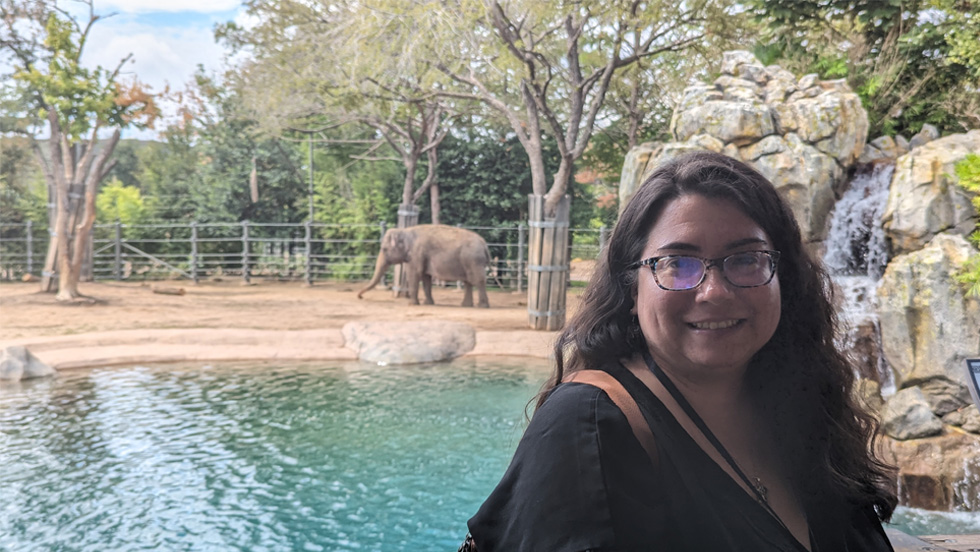
Assistant Professor Natalia Prado-Oviedo, PhD, is studying the genomes of elephants in U.S. zoos to increase the odds of survival for this endangered species.
As a small child in her native Colombia, before she immigrated to this country, Natalia Prado-Oviedo, PhD, assistant professor of animal physiology in the Department of Biology, enjoyed playing with the animals on her grandfather’s farm. “I was culture shocked, so my mom took me to the Bronx Zoo,” she recalled. “I remember seeing my first elephant—I didn’t want to move away.”
After graduating from college, she worked as a veterinary technician at NYU Langone, where she learned about the research process. “I wanted to do research for animal applications, which is how I eventually found my way back to elephants,” she said. Dr. Prado-Oviedo determined to look into the genetic background of elephants in U.S. zoos.
As a research fellow at the Center for Conservation Genomics at the Smithsonian’s National Zoo and Conservation Biology Institute in Washington, D.C., she has been able to do that by working and collaborating with colleagues Janine Brown, PhD, Jesus E. Maldonado, PhD, and Michael G. Campana, PhD, on open-source research focusing on everything from elephant infertility to elephant genomics.
Developing an Epigenetic Clock
In 2016, Dr. Prado-Oviedo began to look for genetic markers in the elephants she studied. In previous studies, she and her colleagues had found that elephants in North American zoos are susceptible to the early onset of age-related diseases such as arthritis and reproductive failures.
Epigenetics is the study of how lifestyle or environmental factors can promote or suppress the expression of certain genes. This process can influence an organism’s health and the difference between its biological age and chronological age, or the number of years it’s lived. Scientists use what’s called an epigenetic clock to determine biological age.
DNA-methylation—an epigenetic process that attaches small methyl-group molecules to the DNA helix—is, according to Dr. Prado-Oviedo, a normal part of growth and development for all mammals. And it is a useful biomarker for assessing biological age. Using a single blood sample, epigenetic clocks based on DNA methylation profiles were developed for a zoo population of 140 elephants. Their research was published in 2021 in the journal Aging Cell. Dr. Prado-Oviedo and her research team intend to use this data to investigate how elephants respond to their environment at a molecular level, both under human care and in range countries where they face many challenges, including the threat of extinction.
“Elephant research is like a cake, with its layers of health histories, genetics, epigenetics, reproductive histories, and more,” Dr. Prado-Oviedo said. “Hopefully, this novel epigenetic clock will advance knowledge of elephants and their care, conservation and management both in zoos and in the wild.”
A Focus on Helping Baby Elephants
Dr. Prado-Oviedo’s current research focus is a large-scale project that aims to link genome variation with epigenetics and health information to gain understanding of elephant endotheliotropic herpesvirus (EEHV)—the leading killer of elephant calves.
“EEHV impacts survivability,” she said. “Babies can be exposed at birth or if another elephant in their herd is shedding the virus. Babies under 10 years old are the most susceptible, especially after they wean and lose support of protective maternal antibodies from their mother’s milk. EEHV suppresses the individual’s immune response, but we don’t yet understand how it does this.”
Yet, some breeding adult elephants are EEHV survivors. “Some get sick and clear it and are now carriers. My question is what about an individual elephant’s genetics allows it to survive? We’re trying to save babies—every baby elephant represents decades of conservation and human effort. To have a baby die from EEHV is crushing for zoos, herds and everyone who loves zoos, as well as elephants in the wild.”
“A lot of data is needed to support this research, including health histories, samples from those who pass away and others who survive. We need to identify genetic markers, which can inform vaccine development as well. And we need to develop more full genomes.”
The American Genetic Association‘s Journal of Heredity, published Dr. Prado-Oviedo’s study that included open-source genomic resources to assist researchers and conservation managers in safeguarding the genetic diversity in dwindling African and Asian elephant populations worldwide.
Encouraging Student Involvement
Since joining the Adelphi faculty in 2021, Dr. Prado-Oviedo has encouraged undergraduate and graduate student involvement and engagement in her research. Graduate student Jennifer Ingenito, who is earning an MS in biology, is working with Dr. Prado-Oviedo to study the genetic markers of captive elephants confronting infertility issues.
“This research is important to me because it will aid in elephant conservation and overall reproductive health of the declining captive African elephant population,” she said. “Our goal is to contribute toward the survival of this magnificent and intelligent species.”